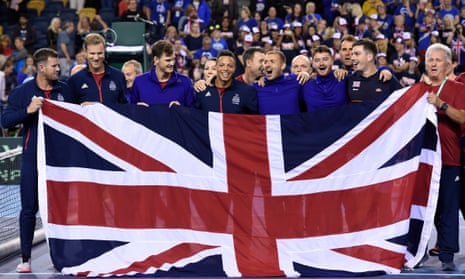This Davis Cup almost runneth over into a dead rubber on Sunday but sanity prevailed after Cameron Norrie had wrapped up the tie against Uzbekistan 3-1, with a quick win against the late substitute Sanjar Fayziev, to ensure Great Britain will be seeded when the competition resumes in its new format in February.
The convention once was that at least four sets of tennis should be played on the final day of a tie, to reward paying fans for their commitment, but, although there was audible disappointment in the stands when the announcement was made, there seemed little point in asking Dan Evans to play Jurabek Karimov in the fifth and redundant rubber after Norrie’s 6-2, 6-2, 6-0 win. It lasted just under two hours. The air had properly gone out of the contest.
The future is less certain. Great Britain might yet be awarded a wild card to join the current semi-finalists and 13 other nations in the new end-of-season tournament in November next year, or be part of the 24-team qualifying rounds, home and away, in February. A competition that began as a challenge between Great Britain and the United States 118 years ago is evolving again, with much less assurance than the 22 forehand winners Norrie put on Fayziev on Sunday.
Even without Andy Murray and Kyle Edmund the prospects for Leon Smith’s squad are promising. The opposition here brought few surprises but the home side did what was needed. Evans was brilliant in a winning comeback, Jamie Murray and Dominic Inglot cleaned up in the doubles, the overall quality of tennis was high and the drama was considerable, especially on day one.
“I’m really interested to see how they do it and their justification for who they give the wild cards to,” Smith said. “Clearly we’d be a strong candidate, based on the last three or four years in the competition, how we’ve hosted ties.” However, if Great Britain have to qualify, they will be hoping for another bonanza of excitement in Glasgow.
It would be the 11th Cup tie in Glasgow in 13 years, just reward for a city that has done much to provide passion for the oldest annual international competition in sport.
The tie was all but nailed on the moment it was announced that Uzbekistan’s stand-out player, Denis Istomin, had hurt his ankle in his endeavours in the opening-day singles and Saturday’s doubles, and Fayziev would step up. He rarely plays singles and his ranking of 448 is 378 places below Norrie but he made a fight of it.
While Karimov gave substance to Istomin’s pre-tournament truism that the Davis Cup often elevates players way above their rankings when he beat Norrie in five sets on Friday, it seemed unlikely Fayziev would do the same to a player determined to erase the embarrassment of that defeat.
Norrie, born in South Africa, raised in New Zealand, nurtured on the college courts of the United States but committed to a career as a British player through his Scottish father and Welsh mother, has settled in quickly in his adopted country. He has a wry sense of humour and a solid game. He looks as if he will be a valuable servant for years to come.
His father had flown the 11,000 miles from Auckland – still with his “filthy Scottish accent” as Norrie fils said – to his native Glasgow, and left a happy man.
Norrie, a hero on his debut against Spain in February, has developed a quick love for the team environment and the format. “It’s pretty lonely out there on the tour,” he said. “You’re by yourself or with just one coach all year round, then we come together as a team. It’s been a great week for us. It’s been so social, everyone getting on with everyone. We’ve had so many good laughs. It does mean a lot to get together and have these big ties, home ties.”
